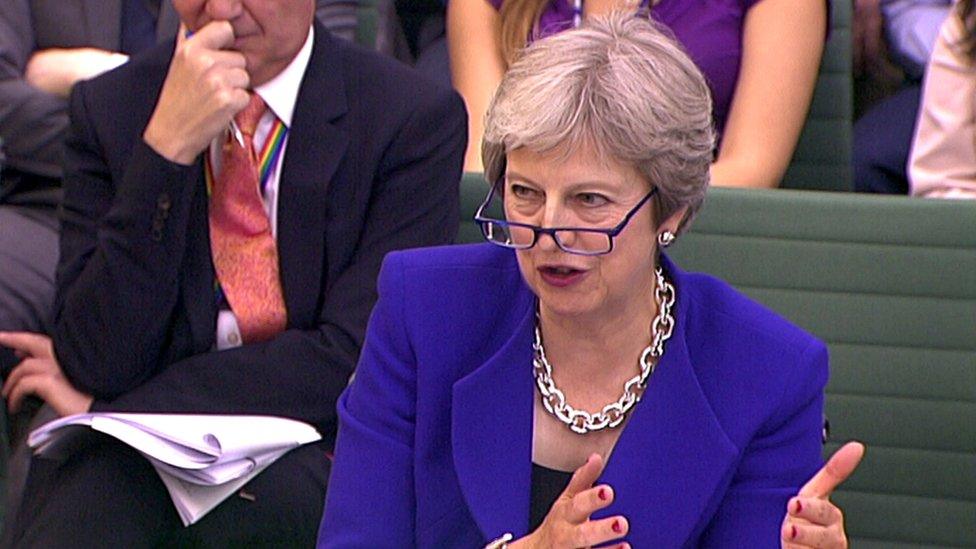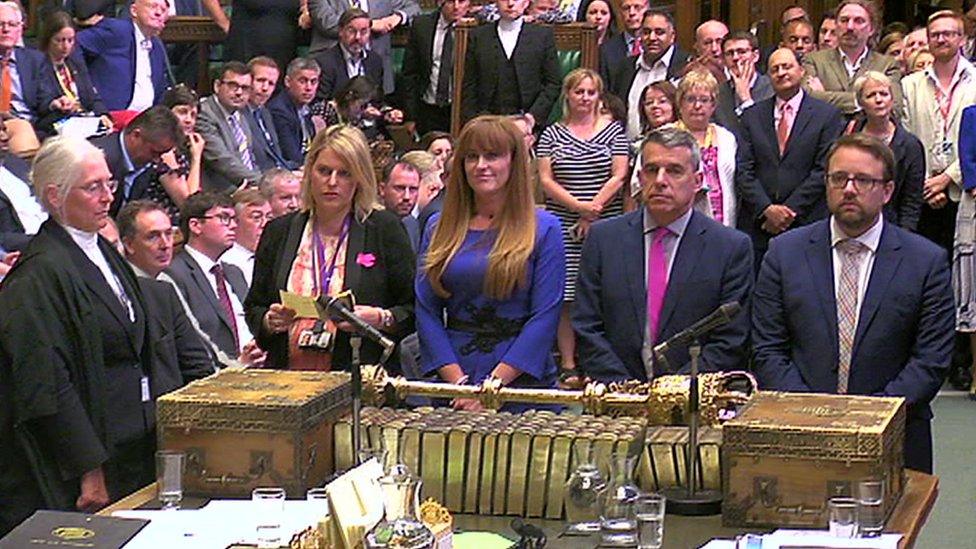Brexit deal must be workable, says Theresa May
- Published
- comments
Conservative MP Andrea Jenkyns challenges the PM to name the time when Brexit became Remain.
Theresa May has insisted any Brexit deal must be "workable" as she came under fire from both Labour and Conservative MPs in the Commons.
During Prime Minister's Questions, she said she disagreed with Tory MP Andrea Jenkyns, who asked her "at what point it was decided Brexit means Remain".
The PM said any deal had to be credible and protect the economy, as well as honouring the 2016 referendum result.
Jeremy Corbyn said the Conservatives had "sunk into a mire" of infighting.
And former foreign secretary Boris Johnson has increased the pressure on the prime minister, accusing her government of "dithering" over what it wants and telling MPs it is "not too late to save Brexit".
Appearing before the Liaison Committee of select committee chairs, Mrs May said she stood by her claim that "no deal was better a bad deal" when it came to Brexit. She said the government was working for a "good deal" but would be stepping up preparations for a "no deal" scenario, with plans to issue "technical notices" to businesses that would be affected.
But she would not set out the "consequences" of leaving the EU without a deal to the public until it happened, she told liaison committee chairwoman Sarah Wollaston.
Mrs May also conceded that her proposed post-Brexit trade and tariff arrangements were a "novel idea" that did not exist anywhere else in the world, adding that that did not matter, if they were the "best" arrangements for the UK.
And she admitted that the "facilitated customs arrangement" plan set out in her Brexit White Paper may not be fully ready by the time the transition period expires at the end of 2020.
And under questioning from veteran Eurosceptic Sir Bill Cash, she denied showing copies of the White Paper to Angela Merkel or other European leaders before it was published and given to MPs.

During the final session of PMQs before the summer recess, Mrs May defended her handling of Brexit negotiations and her recent talks with Donald Trump, telling Mr Corbyn that while the Labour leader "protests, I deliver".
Acknowledging "strong feelings" on all sides, she insisted her blueprint for future relations with the EU was realistic and already being considered by the EU.
In response to Ms Jenkyns's question, she insisted "Brexit continues to mean Brexit" and the government should be "talking about the positives" of leaving.
But the PM added: "I know she has criticised me for looking for a solution that is workable. I disagree with her on that because I think we need a solution which is going to work for the UK."
On Tuesday, ministers saw off a bid by Tory rebels to create a customs union with the EU if a trade deal failed. The rebel amendment to the trade bill was defeated by only six votes.
Twelve Conservatives rebelled against their party by supporting the amendment but the government's total was boosted by the support of four Labour MPs.
Conservative MPs were warned that voting for the amendment, and therefore against the government, could lead to a vote of no confidence in the prime minister or a general election, leading Tory remainer Anna Soubry said.
Tory MP Anna Soubry tells Today 'both political parties are in the grips of their own extremists'
She told BBC Radio 4's Today programme it was an "appalling spectacle" - and that she would be the first in the queue to give her backing to Mrs May.
"The problem is, I don't think that she's in charge any more," said the MP for Broxtowe. "I've no doubt that Jacob Rees Mogg is running our country."
The former minister called for a government of national unity to deal with Brexit.
"I personally would abandon the Labour frontbench and I would reach beyond it and I would encompass Plaid Cymru, the SNP and other sensible, pragmatic people who believe in putting this country's interests first and foremost," she said.
She also said that many MPs were "frightened of the extremes" within their local associations. Hardline Brexiteers led by Mr Rees Mogg are ruthless and organised, while the "pragmatic majority" are loyal to the prime minister, she added.
'Genuine mess-up'
Cabinet Office minister David Lidington, who is effectively Mrs May's second-in-command, rejected claims her government was in desperate straits over Brexit.
"When the government doesn't have an overall majority in either house of Parliament, things are sometimes close on votes," he told BBC Radio 4's Today programme.
But he said the prime minister was "absolutely focused on getting the right deal for the country in negotiations with her European counterparts".
He apologised to Lib Dem deputy leader Jo Swinson, who has accused the Conservatives of double crossing her in Tuesday night's vote.
Ms Swinson, who is on a maternity leave, had a "pairing" arrangement with Tory chairman Brandon Lewis, which meant he should not have taken part in the vote.
Mr Lidington said the fact that Mr Lewis had voted was a "genuine mess-up" that should not have happened and he had apologised to Ms Swinson.


- Published17 July 2018
- Published17 July 2018

- Published30 December 2020
